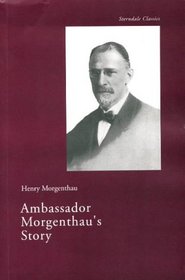Search -
Ambassador Morgenthau's Story (Sterndale Classics)
Ambassador Morgenthau's Story - Sterndale Classics
Author:
"Ambassador Morgenthau's Story," one of the best known personal accounts of the Armenian Genocide, has been republished by the Gomidas Institute. The new edition features an introduction by Ara Sarafian. "This important and oft-cited work has been out of print for some time now," Sarafian noted. "April 24, 2000, seemed an opportune moment to m... more »
Author:
"Ambassador Morgenthau's Story," one of the best known personal accounts of the Armenian Genocide, has been republished by the Gomidas Institute. The new edition features an introduction by Ara Sarafian. "This important and oft-cited work has been out of print for some time now," Sarafian noted. "April 24, 2000, seemed an opportune moment to m... more »
ISBN-13: 9781903656167
ISBN-10: 1903656168
Publication Date: 12/31/2004
Pages: 202
Rating: ?
ISBN-10: 1903656168
Publication Date: 12/31/2004
Pages: 202
Rating: ?
0 stars, based on 0 rating
Genres:




